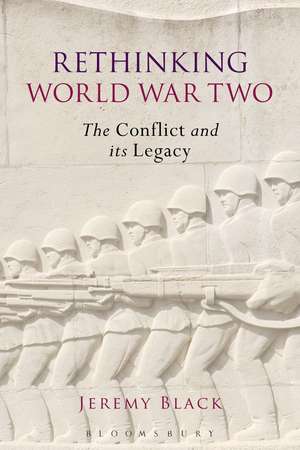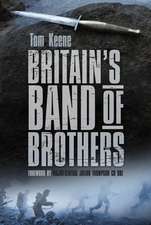Rethinking World War Two: The Conflict and its Legacy
Autor Jeremy Blacken Limba Engleză Paperback – 28 ian 2015
| Toate formatele și edițiile | Preț | Express |
|---|---|---|
| Paperback (1) | 186.35 lei 43-57 zile | |
| Bloomsbury Publishing – 28 ian 2015 | 186.35 lei 43-57 zile | |
| Hardback (1) | 774.46 lei 43-57 zile | |
| Bloomsbury Publishing – 28 ian 2015 | 774.46 lei 43-57 zile |
Preț: 186.35 lei
Preț vechi: 228.44 lei
-18% Nou
Puncte Express: 280
Preț estimativ în valută:
35.66€ • 37.33$ • 29.50£
35.66€ • 37.33$ • 29.50£
Carte tipărită la comandă
Livrare economică 07-21 aprilie
Preluare comenzi: 021 569.72.76
Specificații
ISBN-13: 9781472583222
ISBN-10: 1472583221
Pagini: 272
Ilustrații: 5 bw illus
Dimensiuni: 156 x 234 x 15 mm
Greutate: 0.41 kg
Editura: Bloomsbury Publishing
Colecția Bloomsbury Academic
Locul publicării:London, United Kingdom
ISBN-10: 1472583221
Pagini: 272
Ilustrații: 5 bw illus
Dimensiuni: 156 x 234 x 15 mm
Greutate: 0.41 kg
Editura: Bloomsbury Publishing
Colecția Bloomsbury Academic
Locul publicării:London, United Kingdom
Caracteristici
Offers a thorough survey of the key debates relating to the causes, course and aftermath of the Second World War
Notă biografică
Jeremy Black is Professor of History at the University of Exeter, UK, and a Senior Fellow at the Center for the Study of America and the West at the Foreign Policy Research Institute in Philadelphia, USA. His books include War: A Short History (2009), The Great War and the Making of the Modern World (2011) and Contesting History (2014).
Cuprins
Preface1. The Importance of Military History2. Causes3. Alliance Politics and Grand Strategy4. Explanations of Victory5. Domestic Politics6. Recollection: The War in Europe7. Recollection: The War in Asia8. Political Echoes9. Military Echoes10. ConclusionsSelected Further ReadingBibliographyIndex
Recenzii
It is testament to Black's mastery of his craft that the book is in many ways successful ... [Rethinking World War Two is] the most succinct and up-to-date account of post-war memory work across the globe available in English ... Black is an assured and thoughtful guide to these cultural and geopolitical aftershocks of the Second World War.
Jeremy Black brings his sharp analytic mind and his global perspective to this new treatment of the Second World War. Readers will find much to engage and debate in this insightful book.
Black has the ability to say more in sentence than most historians in a paragraph. Here he analyzes World War Two by discussing its events in the contexts of recollection and memorialization. He asks how the conflict's key aspects, causes, conduct and politics are addressed and understood in ongoing debates that make the war a recovered and living memory as well as a received one.
Jeremy Black is a truly brilliant historian who repeatedly challenges our perceptions of how we view the past. This is an utterly compelling and fascinating work that is full of thought-provoking wisdom, and which proves there is still much to learn about this most enduringly fascinating conflict.
At the beginning of the 21st century, a new perspective on World War Two is required. This is what the master historian Jeremy Black offers in the present volume. Rethinking World War Two will certainly force all of us to seriously rethink the causes, course and consequences of the last World War.
Most countries of the world have seen their history, right down to the present day, deeply influenced by World War II. It's no exaggeration to say that the conflict has become part of the world's DNA and public history. Much of the commentary -- especially that wielded by politicians -- is bowdlerized and unreliable, and so Jeremy Black has written a brilliant guide to the controversies and word games. Appeasement is dealt with not as cowardly submission, but as a canny attempt to divide and weaken pressures from multiple powers. Styles of warfare, alliance, economics and domestic politics all contributed to victory or defeat, with lasting consequences. Ultimately, as Black points out, every combatant nation has labored to clean up its history in the war, most notably the Russians, Germans and Japanese. In this deep but succinct book, Black gives context and perspective to these ongoing debates.
Black's purpose is not to provide a concise history of WW II but rather to focus on the political causes of the war along with the domestic politics that shaped the wartime strategies of the belligerents . The author provides a number of insightful comparisons between the strategic goals and postwar justifications of the belligerents. For example, in examining questions relating to strategic aerial bombing, he demolishes the notion that the Allied bombing campaign was morally equivalent with German crimes . Black assumes a great deal of knowledge . Summing Up: Recommended. Upper-division undergraduates and above.
Jeremy Black brings his sharp analytic mind and his global perspective to this new treatment of the Second World War. Readers will find much to engage and debate in this insightful book.
Black has the ability to say more in sentence than most historians in a paragraph. Here he analyzes World War Two by discussing its events in the contexts of recollection and memorialization. He asks how the conflict's key aspects, causes, conduct and politics are addressed and understood in ongoing debates that make the war a recovered and living memory as well as a received one.
Jeremy Black is a truly brilliant historian who repeatedly challenges our perceptions of how we view the past. This is an utterly compelling and fascinating work that is full of thought-provoking wisdom, and which proves there is still much to learn about this most enduringly fascinating conflict.
At the beginning of the 21st century, a new perspective on World War Two is required. This is what the master historian Jeremy Black offers in the present volume. Rethinking World War Two will certainly force all of us to seriously rethink the causes, course and consequences of the last World War.
Most countries of the world have seen their history, right down to the present day, deeply influenced by World War II. It's no exaggeration to say that the conflict has become part of the world's DNA and public history. Much of the commentary -- especially that wielded by politicians -- is bowdlerized and unreliable, and so Jeremy Black has written a brilliant guide to the controversies and word games. Appeasement is dealt with not as cowardly submission, but as a canny attempt to divide and weaken pressures from multiple powers. Styles of warfare, alliance, economics and domestic politics all contributed to victory or defeat, with lasting consequences. Ultimately, as Black points out, every combatant nation has labored to clean up its history in the war, most notably the Russians, Germans and Japanese. In this deep but succinct book, Black gives context and perspective to these ongoing debates.
Black's purpose is not to provide a concise history of WW II but rather to focus on the political causes of the war along with the domestic politics that shaped the wartime strategies of the belligerents . The author provides a number of insightful comparisons between the strategic goals and postwar justifications of the belligerents. For example, in examining questions relating to strategic aerial bombing, he demolishes the notion that the Allied bombing campaign was morally equivalent with German crimes . Black assumes a great deal of knowledge . Summing Up: Recommended. Upper-division undergraduates and above.









